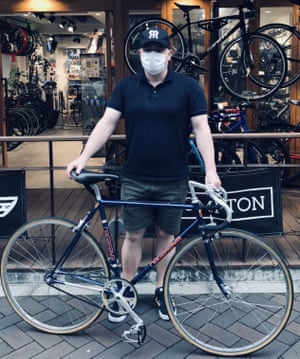In Japan wearing a mask is habitual – can the UK follow suit?
Justin McCurry
4-5 minutes
As a resident of a country where not wearing a mask is now akin to venturing out in one’s underwear, I’ve watched with growing exasperation the debate in the UK over whether wearing a face covering is a potentially effective defence against Covid-19.
Although the benefits of hand hygiene and social distancing – two habits promoted by the World Health Organization in the early days of the
pandemic – are widely accepted, it will take time to establish which combinations of factors, both official and cultural, have
spared some countries while leaving others battling high numbers of infections and deaths.
Japan, like South Korea, Hong Kong and Taiwan, has so far
avoided coronavirus catastrophe. Each has approached the pandemic in a different way, but they are united by a public acceptance, largely unprompted by the authorities, of mask wearing.
While the Japanese government’s calls to avoid the
three Cs – confined spaces, crowded places and close contact – are now, belatedly, being heeded in other countries, Japanese friends and family are baffled at the time it has taken Boris Johnson’s government to half-embrace the humble mask.
The mass wearing of masks is habitual in
Japan, beginning with the arrival of the flu season and continuing through the spring among the country’s legions of hay fever sufferers. In the case of flu, the logic is the same as that now being applied to Covid-19: not only does a mask hide runny, sore noses, it helps prevent the sufferer from spreading their germs, especially on packed commuter trains.
As soon as it became clear, as long ago as February, that Japan’s encounter with coronavirus would not be confined to the passengers and crew of the
Diamond Princess, it was hard to spot anyone in my Tokyo neighbourhood without a face covering. Most people opted for surgical masks with a thin metal strip that can be bent to fit snugly over the bridge of the nose.
Masks of all shapes quickly disappeared from supermarket and pharmacy shelves, prompting the prime minister, Shinzo Abe, to distribute two reusable cloth masks to every household in the country – a move
met with more derision than gratitude.
From home delivery staff to supermarket shelf-stackers and bank tellers, the mask has become a non-negotiable accoutrement to the regular work uniform.

Justin McCurry gauges mask-wearing on his cycles around Tokyo. Photograph: Justin McCurry
On my regular – and masked – bike rides, I keep a rough count of the number of other road users who are not similarly protected. By my wholly unscientific tally, mask loyalists easily outnumber the rebels, including among solitary drivers.
Masks are back in plentiful supply, which is just as well. I will not leave my apartment without one stretched across my nose and mouth, knowing that sharing the lift with a neighbour or walking into the supermarket “barefaced” are luxuries lost to the pre-Covid era. Long before Johnson’s conversion to covering up in public, I sent several dozen disposable masks to my parents, along with regular entreaties to wear them when they decide the time is right to do some non-essential shopping.
While people in the UK share a plethora of objections to mask wearing, Japan is bracing for several weeks of searing heat and humidity – the sort of conditions that can make a paper mask feel like an instrument of torture.
Clothing firms are churning out lightweight “summer” versions, as medical experts warn about the risks of heat stroke and dehydration, especially among older people. Yet even when temperatures reach the mid-30s, I and most of my fellow Tokyoites will remain partially hidden behind those little white rectangles.






